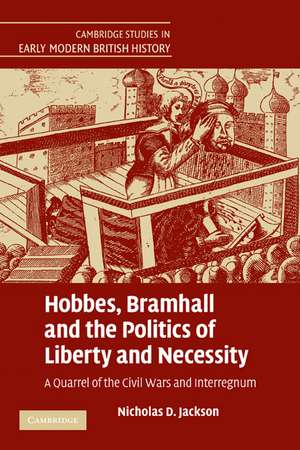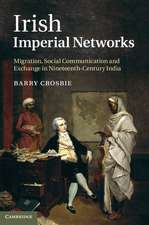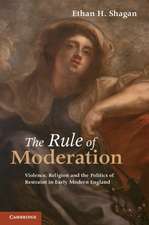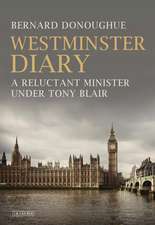Hobbes, Bramhall and the Politics of Liberty and Necessity: A Quarrel of the Civil Wars and Interregnum: Cambridge Studies in Early Modern British History
Autor Nicholas D. Jacksonen Limba Engleză Paperback – 16 feb 2011
| Toate formatele și edițiile | Preț | Express |
|---|---|---|
| Paperback (1) | 366.03 lei 6-8 săpt. | |
| Cambridge University Press – 16 feb 2011 | 366.03 lei 6-8 săpt. | |
| Hardback (1) | 758.22 lei 6-8 săpt. | |
| Cambridge University Press – 17 oct 2007 | 758.22 lei 6-8 săpt. |
Din seria Cambridge Studies in Early Modern British History
-
 Preț: 195.92 lei
Preț: 195.92 lei - 8%
 Preț: 530.93 lei
Preț: 530.93 lei - 11%
 Preț: 693.36 lei
Preț: 693.36 lei -
 Preț: 317.75 lei
Preț: 317.75 lei -
 Preț: 240.74 lei
Preț: 240.74 lei - 8%
 Preț: 530.27 lei
Preț: 530.27 lei - 9%
 Preț: 627.56 lei
Preț: 627.56 lei -
 Preț: 350.34 lei
Preț: 350.34 lei - 14%
 Preț: 919.83 lei
Preț: 919.83 lei -
 Preț: 422.86 lei
Preț: 422.86 lei -
 Preț: 419.37 lei
Preț: 419.37 lei -
 Preț: 314.10 lei
Preț: 314.10 lei -
 Preț: 441.96 lei
Preț: 441.96 lei -
 Preț: 366.58 lei
Preț: 366.58 lei - 11%
 Preț: 695.39 lei
Preț: 695.39 lei -
 Preț: 278.34 lei
Preț: 278.34 lei -
 Preț: 426.88 lei
Preț: 426.88 lei - 14%
 Preț: 919.33 lei
Preț: 919.33 lei - 14%
 Preț: 773.45 lei
Preț: 773.45 lei -
 Preț: 211.02 lei
Preț: 211.02 lei -
 Preț: 334.35 lei
Preț: 334.35 lei - 14%
 Preț: 828.64 lei
Preț: 828.64 lei -
 Preț: 356.88 lei
Preț: 356.88 lei -
 Preț: 446.58 lei
Preț: 446.58 lei - 14%
 Preț: 830.20 lei
Preț: 830.20 lei -
 Preț: 284.39 lei
Preț: 284.39 lei - 14%
 Preț: 867.49 lei
Preț: 867.49 lei - 14%
 Preț: 1223.82 lei
Preț: 1223.82 lei - 14%
 Preț: 963.64 lei
Preț: 963.64 lei -
 Preț: 336.20 lei
Preț: 336.20 lei -
 Preț: 445.81 lei
Preț: 445.81 lei -
 Preț: 274.11 lei
Preț: 274.11 lei -
 Preț: 362.54 lei
Preț: 362.54 lei - 14%
 Preț: 923.48 lei
Preț: 923.48 lei -
 Preț: 275.08 lei
Preț: 275.08 lei - 14%
 Preț: 733.64 lei
Preț: 733.64 lei -
 Preț: 276.39 lei
Preț: 276.39 lei -
 Preț: 336.48 lei
Preț: 336.48 lei -
 Preț: 408.81 lei
Preț: 408.81 lei -
 Preț: 309.27 lei
Preț: 309.27 lei -
 Preț: 369.67 lei
Preț: 369.67 lei -
 Preț: 274.27 lei
Preț: 274.27 lei - 14%
 Preț: 778.74 lei
Preț: 778.74 lei
Preț: 366.03 lei
Nou
Puncte Express: 549
Preț estimativ în valută:
70.05€ • 72.94$ • 59.20£
70.05€ • 72.94$ • 59.20£
Carte tipărită la comandă
Livrare economică 10-24 martie
Preluare comenzi: 021 569.72.76
Specificații
ISBN-13: 9780521181440
ISBN-10: 0521181445
Pagini: 356
Dimensiuni: 152 x 229 x 20 mm
Greutate: 0.52 kg
Editura: Cambridge University Press
Colecția Cambridge University Press
Seria Cambridge Studies in Early Modern British History
Locul publicării:Cambridge, United Kingdom
ISBN-10: 0521181445
Pagini: 356
Dimensiuni: 152 x 229 x 20 mm
Greutate: 0.52 kg
Editura: Cambridge University Press
Colecția Cambridge University Press
Seria Cambridge Studies in Early Modern British History
Locul publicării:Cambridge, United Kingdom
Cuprins
Introduction; 1. Bishop Bramhall, the 'Great Arminian', 'Irish Canterbury' and 'Most Unsound Man in Ireland', 1633–41; 2. Bishop Bramhall, the Earl of Newcastle, Thomas Hobbes and the first English Civil War; 3. Hobbes's flight to France, De Cive and the beginning of the quarrel with Bramhall, summer 1645; 4. An epistolary skirmish, 1645–6: Bramhall, 'Discourse', Hobbes, 'Treatise' and Bramhall, 'Vindication'; 5. Bramhall and the Royalist schemes of 1646–50; 6. Hobbes and Leviathan among the exiles, 1646–51; 7. The public quarrel: Hobbes, Of Liberty and Necessity, 1654, Bramhall, Defence of True Liberty, 1655 and Hobbes, Questions concerning Necessity, Liberty and Chance, 1656; 8. Castigations of Hobbes's Animadversions and The Catching of Leviathan, 1657–8: Hobbes as Leviathan of Leviathans; 9. The restoration and death of Bramhall and Hobbes's last word, 1668; Conclusion.
Recenzii
Review of the hardback: 'Nicholas Jackson's book is a thoroughly researched and well-written study of the notorious and heated dispute between Hobbes and one of his most prominent Anglican adversaries, John Bramhall, bishop of Derry, on theological problems pertaining to free will, predestination, liberty and free choice, but also on political matters such as the rights and duties of the civil magistrate or the role of the Anglican episcopacy within the constitutional framework of the English body politic. Although Hobbes's and Bramhall's long-lasting quarrel has been repeatedly discussed in a number of scholarly articles, it has never been dealt with in such painstaking detail. Jackson paints a very colourful picture of the two antagonists and emphasises that they were as oddly matched physically as intellectually.' Journal of Ecclesiastical History
Review of the hardback: 'Jackson provides a rich historical background to the quarrel, noting other issues that concerned each man during this period. … [He] concludes with an excellent discussion …' Church History
'Nicholas Jackson's account of the debate over free will between Hobbes and Bramhall, originating in the 1640s before spilling into print in the 1650s, is yet another welcome contribution to the study of Hobbes, while also bringing the bishop out from the philosopher's shadow and releasing their encounter from the confines of philosophy and theology. Cambridge University Press continues to confirm the value of adding the consideration of context to the consideration of texts, in its Early Modern British History series as much as those series overseen by Quentin Skinner.' Geoff Kemp, The European Legacy
Review of the hardback: 'Jackson provides a rich historical background to the quarrel, noting other issues that concerned each man during this period. … [He] concludes with an excellent discussion …' Church History
'Nicholas Jackson's account of the debate over free will between Hobbes and Bramhall, originating in the 1640s before spilling into print in the 1650s, is yet another welcome contribution to the study of Hobbes, while also bringing the bishop out from the philosopher's shadow and releasing their encounter from the confines of philosophy and theology. Cambridge University Press continues to confirm the value of adding the consideration of context to the consideration of texts, in its Early Modern British History series as much as those series overseen by Quentin Skinner.' Geoff Kemp, The European Legacy
Descriere
This book was the first full account of the famous debate between Thomas Hobbes and John Bramhall.











